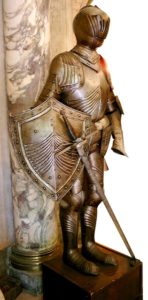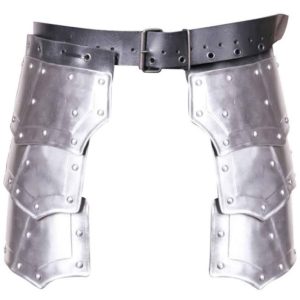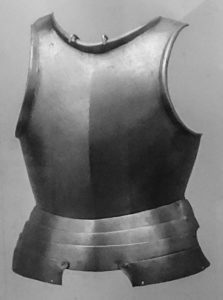When I first began hearing of PPE during the coronavirus pandemic, I had no idea what it referred to. I had no personal connections to the medical field to help me out. Then I viewed hours of newscasts that declared the need for and the shortages of this “personal protective equipment.” Subsequent requirements of its use for even everyday people like me locked in the personal aspect. Now the term will forever be embedded in my vocabulary.
Soon after acquiring this new knowledge, I noticed the similarities between the battle against the coronavirus and the spiritual battle we face every day. Government and health care leaders have proclaimed we are in a war against an enemy we can’t see. However, we can observe the destructive and deadly effects of the virus. Spiritually, we are also in an ongoing battle against an unseen enemy. In I Peter 5:8, we are told, “Your enemy the devil prowls around like a roaring lion looking for someone to devour.”
We can see his destructive work in the world by just turning on the news. And we see it in our lives by looking as close as our own relationships. We are quick to see people as our enemies: the person who doesn’t do what I think is right, the neighbor who doesn’t look or talk like me, a relative who has hurt me, even a friend who expresses different beliefs than mine. But our real enemy is Satan. “Our struggle is not against flesh and blood, but against the rulers, against the authorities, against the powers of this dark world and against the spiritual forces of evil in the heavenly realms” (Ephesians 6:12). And to make the situation even more difficult, our unseen enemy is “more crafty than any of the wild animals the Lord God had made” (Genesis 3:1).
How are we to fight this invisible and deceitful enemy? We are told to “resist him” (I Peter 5:9; James 4:7) and “take your stand against the devil’s schemes” (Ephesians 6:11). So rather than run and hide, we are to plant ourselves in plain sight of this devious foe that is out to eat us alive, and we can’t even see him coming. We need some serious PPE.
The good news is that God has provided us with every piece of equipment we will ever need to fight this battle and to be victorious. Masks, face shields, disposable gloves, and isolation gowns will not protect us against this cunningly deceitful and invisible foe who is always present and bent on making a meal of us. But God would never allow us to be in such a position without supplying us with the very best personal protective equipment that exists.

Our spiritual PPE is the armor of God: “Put on the full armor of God so that you can take your stand against the devil’s schemes” (Ephesians 6:11). Two verses later, Paul repeats these instructions. “Therefore put on the full armor of God, so that when the day of evil comes, you may be able to stand your ground, and after you have done everything, to stand” (Ephesians 6:13). He didn’t want us to miss the importance of using the protection God has provided. Being able to stand against the enemy depends on it. So I decided to dig deeper.
Our full armor consists of six pieces. We’ll look at three of them today and the other three in Part Two. We’ll examine what they are and learn how we can use them to defeat our spiritual enemy.
“Stand firm then, with the belt of truth buckled around your waist . . .” (Ephesians 6:14)
The first piece of armor is the belt of truth. The belt was also referred to as a girdle. It fit securely around the waist and kept other pieces of armor in place, making it a foundational piece of equipment. The loose fitting robes of the day prevented quick movement. Men tucked their robes into their belts (“girded up their loins”) so they could move around easily, “especially as preparatory to active work” (HELPS Word-studies). Can you picture an army who neglected to grab their belts on the way to battle? Within minutes they would all be flat on their faces, having tripped over their robes. It would have been instant victory for the enemy without raising a sword.
We are to be girded with truth. Some translations say “having girded your loins with truth.” The Greek word for “truth” is alétheia and it means “(true to fact), reality . . . the opposite of illusion” (HELPS Word-studies). Our enemy is the master of illusion. “Satan himself masquerades as an angel of light” (2 Corinthians 11:14). He makes lies sound morally correct because he fits them into what we think truth is or what we want truth to be. But truth is not the way I perceive facts. It is “divine truth revealed to man” (Strong’s Concordance).

How is this divine truth revealed to us? Jesus said, “I am the . . . truth” (John 14:6). He also said His Father’s “word is truth” (John 17:17). Truth is revealed to us through Jesus and the Bible. We can’t figure it out on our own. “For my thoughts are not your thoughts, neither are your ways my ways,” declares the Lord. “As the heavens are higher than the earth, so are my ways higher than your ways and my thoughts than your thoughts” (Isaiah 55:8-9). We must enter our daily battles secure in what God says in His Word—truth about who He is, what He’s doing in the world, how He works in our lives, and so much more.
If we try to face the enemy without truth, we are sure to get tripped up. He can manipulate us into believing something to be true because it feels right. But we won’t fall into his deception if we measure everything we hear against what God says is true.
“. . . with the breastplate of righteousness in place” (Ephesians 6:14)
The Greek word for “breastplate” is thorax, which is where we get our word for the area of the body the second piece of armor covered. Among other vital parts of the body, it protected the heart against a fatal wound. Compare it to a bulletproof vest today. One type of ancient armor was scale consisting of overlapping pieces of metal that looked like fish scales. This was the armor worn by Goliath (I Samuel 17:5).
In the Bible, “heart” figuratively refers to “the fountain and seat of the thoughts, passions, desires, appetites, affections, purposes, endeavors” (Thayer’s Greek Lexicon). It is our “inner self, will, intention, center” (Strong’s), and it needs protecting. We are told in Proverbs 4:23, “Above all else, guard your heart, for everything you do flows from it.” We see in Matthew 15:19 how ugly that can be: “For out of the heart come evil thoughts, murder, adultery, sexual immorality, theft, false testimony, slander.” Righteousness is what protects the heart so that good things will flow out.

Righteousness is “the approval of God” and “refers to what is deemed right by the Lord” (HELPS Word-studies). As with truth, we can’t decide for ourselves what is good and upright. God sets the standard. Because we can never reach God’s standard on our own, He gives us His perfect righteousness at the moment we believe in Jesus. This wondrous gift not only removes our sin so we can stand in the presence of the Holy God (2 Corinthians 5:21), but it also enables us to walk in His righteousness each day going forward. I think the latter is what putting “the breastplate of righteousness in place” refers to.
Scripture makes it clear we are to live righteous lives, indicating action on our part: “blessed are they . . . who constantly do what is right” (Psalm 106:3); “to do what is right and just is more acceptable to the Lord than sacrifice” (Proverbs 21:3); “everyone who practices righteousness is born of Him” (I John 2:29); “pursue righteousness” (I Timothy 6:11); “he who sows righteousness reaps a sure reward” (Proverbs 11:18); “offer the sacrifices of righteousness” (Psalm 4:5); “the righteous acts of the saints” (Revelation 19:8). Suiting up with the breastplate of righteousness means choosing to do the things we know God approves of.
The enemy is always looking for ways to tempt us into actions that don’t have “the approval of God.” He will find any unguarded area of our lives, like an enemy arrow finding the spot where a scale is missing, and attack us there. We are told, “do not give the devil a foothold” (Ephesians 4:27). We can fight off his temptations by living lives of integrity, every day making the choices that have divine approval.
“. . . and with your feet fitted with the readiness that comes from the gospel of peace” (Ephesians 6:15)
The third piece of armor, covering for the feet, was extremely important to the ancient soldier. If his feet were wounded, he could not stand his ground against his enemy, or pursue him, or, if he was overpowered, retreat to safety while he devised another plan of attack.
Fitted means “to bind under” (Strong’s), and it indicates someone working directly under the authority of someone else (HELPS Word-studies). A soldier does not decide on his own to enter a battle; he engages only under the authority of his commander and at his leading. Likewise, we need to go into battle under God’s authority.
We are to be “fitted with . . . readiness,” prepared for whatever situation we find ourselves in. When God was about to lead the Israelites out of their life of slavery in Egypt, He gave them specific instructions for eating the first Passover meal so they would be ready when He moved. “This is how you are to eat it: with your cloak tucked into your belt, your sandals on your feet and your staff in your hand” (Exodus 12:11). When we find ourselves in a battle with the enemy, it is too late to prepare.
Our readiness is marked by “promptitude and alacrity” (Thayer’s). It isn’t dragging ourselves and our assembled gear onto the battlefield and mumbling, “Okay, I’m here.” It is being prompt and alert and cheerful. That last descriptor surprised me, but I gave it some thought. It should be a delight to serve under God. And how unnerving it must be to the enemy to meet up with a bunch of jolly, grinning opponents.

We are told this kind of readiness “comes from the gospel of peace.” Gospel is “the good news of the coming of the Messiah” (Strong’s). It literally means “God’s good news” and can mean all the Bible because the entire book is God revealing Himself to us. Peace is “quietness, rest, peace of mind” and the word was used as “a common Jewish farewell, in the Hebraistic sense of the health (welfare) of an individual” (Strong’s). Peace is “wholeness, i.e. when all essential parts are joined together; . . . (God’s gift of wholeness)” (HELPS Word-studies).
Peace isn’t feeling good because things are going the way we want them to. Here it means the completeness we have when we are “joined together” with Jesus, the Messiah, and in our proper place with Him as our leader. He is essential to us experiencing quietness and rest in our spirit. The good news of God’s peace is what prepares us for battle—even filling us with cheerfulness.
I love how this verse in Isaiah wraps feet, good news, and peace all up together and ends with the declaration of how we are able to experience this wholeness: How beautiful on the mountains are the feet of those who bring good news, who proclaim peace, who bring good tidings, who proclaim salvation, who say to Zion, “Your God reigns!” (Isaiah 52:7).
The enemy wants us to live in fear and unrest and anger. If we enter the battle like that, we will lose sight of who our enemy is and end up fighting a fleshly battle. We will not achieve God’s purpose, which is the only reason for us to be in the battle. But we have God’s gift of wholeness available to us. This peace enables us to stand confidently against the enemy, knowing and declaring that “our God reigns.”
~~~
In Part Two, we’ll look at the other three pieces of PPE God has given us to fight our spiritual enemy. If you haven’t been taking these into your battles, don’t wait for the next post to begin suiting up.
[NOTE: Greek definitions and commentary notes are from Bible Hub. See Resources.]




Angie Camp
September 16, 2020I appreciate your indepth & practical explanation of heart! Angie
bspencer
September 16, 2020Thank you for your comment, Angie. The Biblical concept of “heart” has been difficult for me to grasp . . . and I’m still working on it.
Brenda
September 16, 2020What a great concept, I love the idea of “spiritual PPE.” I was fascinated by the belt and how they had to tuck (gird) their robes before they could move easily and fast. Your visual of going into battle with robes flowing is a hoot. Thanks! I’m looking forward to Part 2.
bspencer
September 16, 2020I found so many interesting things for myself while studying this. I’m glad you found something fascinating as well. Personally, I think that heavy armor would have been about as difficult to move in as robes. I’m thankful that our spiritual armor is light and nonrestrictive. Thanks, Brenda!
Sharon Bayes
September 19, 2020You explained these concepts well and gave me ideas to think about. I’m looking forward to part 2. I started reading the book Angels by Billy Graham and found it most helpful too.
bspencer
September 19, 2020Thank you for your comment, Sharon. It’s good to know that the ideas came across clearly. I think you may have mentioned the book Angels to me before. I’ll have to check it out.